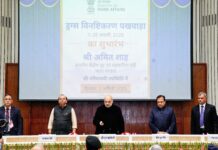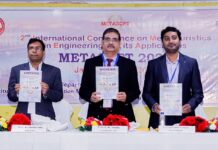By Press Information Bureau
NEW DELHI/BHUBANESWAR: Prime Minister Shri Narendra Modi will visit Balrampur, Uttar Pradesh and inaugurate the Saryu Nahar National Project on 11th December at around 1 PM. The work on the project started in 1978 but due to lack of continuity of budgetary support, interdepartmental coordination and adequate monitoring, it got delayed and was not completed even after nearly four decades.
Prime Minister’s vision for farmer welfare and empowerment, and his commitment to prioritise long pending projects of national importance, brought much needed focus on the project. Consequently in 2016, the project was brought under Pradhan Mantri Krishi Sinchayee Yojana with the target to complete it in a time bound manner. In this endeavour, innovative solutions were found for new land acquisition to construct new canals and fill the critical gaps in the project, and also for resolving the pending litigation related to the previous land acquisitions. The renewed focus on the project has resulted in the project being completed in only about four years.
The Saryu Nahar National Project has been built with a total cost of more than Rs. 9800 crore, out of which more than Rs 4600 crore was provisioned in the last four years. The project also involves interlinking of five rivers – Ghaghara, Saryu, Rapti, Banganga and Rohini to ensure optimum usage of water resources of the region.
The project will provide assured water for irrigation of over 14 lakh hectares of land and benefit about 29 lakh farmers of over 6200 villages. It will benefit nine districts of Eastern Uttar Pradesh namely – Bahraich, Shravasti, Balrampur, Gonda, Siddharthnagar, Basti, Sant Kabir Nagar, Gorakhpur and Maharajganj. The farmers of the region, who were the worst sufferers of the inordinate delay in the project, will now immensely benefit from the upgraded irrigation potential. They will now be able to grow crops on a larger scale and maximise the agri-potential of the region.






























